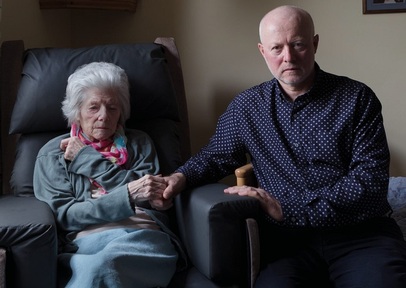People with dementia have spent billions waiting for government care solution
Alzheimer’s Society reveals people living with dementia have spent almost £15 billion of their own money in the last two years waiting for the government to reform social care.
In the two-year period, the total number of people over 65 diagnosed with dementia has increased by 33,000 in England, adding significantly to all those struggling to get the dementia care they need.
Alzheimer’s Society’s analysis builds on a damning picture supported by a number of recent reports including the new ADASS budget survey, and Healthwatch dementia care review report.

All the evidence shows that, since the promise of the green paper on social care reform in March 2017, the dementia care crisis has reached absolute breaking point – and is financially punishing people with dementia, their families, as well as the NHS.
Jeremy Hughes, chief executive of Alzheimer’s Society, said: “This shocking sum of money spent by people with dementia over the last two years trying to get access to the care and support they desperately need is utterly unacceptable.
“And the amount and quality of care they’re getting for it – those who can afford it - just isn’t good enough. The results are people with dementia and their families falling victim to this dreadfully broken system.”
Alzheimer’s Society has organised a photo exhibition of 12 families in Parliament today exposing the appalling reality so many families affected by dementia across the country face. These stories include a woman who couldn’t leave hospital because she still didn’t have a care assessment after a year of waiting. The exhibition reveals the awful circumstances people find themselves in due to the failing system.
’Hundreds of thousands of people affected by dementia in this country are facing financial punishment’
Phillip Scott, 59, from London, attending the exhibition said: “When my mum was diagnosed with dementia at 82, she received little support from health professionals, and my sister and I did not receive any guidance on what was to come.
“After social services moved her into a care home it was only paid for by the local authority for the first six weeks. After that, my mum had to become self-funding for her care. After all of my mum’s savings were used up, we had to use the proceeds from the sale of her home.
“It took three attempts before we managed to get continuing health care funding for her. The whole process of having to argue again and again why my mum needed support was really harrowing. Even now, they have come back several times to reassess her, and we are afraid that the funding will be taken away. In total, we have spent around £160,000 on my mum's care.”
Jeremy Hughes added: “Like the families in our exhibition, hundreds of thousands of people affected by dementia in this country are facing financial punishment, just because they happened to develop dementia and not some other disease. The evidence of the gross inequity continues to pile up, and yet still the Government does nothing.
“We need an immediate cash injection through a dedicated dementia fund, while the government works out a long-term solution to finally end this crisis in care. With diagnosis rates of dementia at an all-time high, action can’t come soon enough.”
is calling for urgent investment in a dedicated £2.4 billion dementia fund to end the dementia penalty people face when paying for care.
The dementia fund would sit within the NHS - Alzheimer’s Society recommends that the money for the fund should come from the so far £3.5bn unallocated funding for community care attached to the NHS long-term plan. The fund would cover the additional social care costs people with dementia are asked to pay because of the complexity of their health condition.
Since the announcement of the social care green paper in March 2017, there has been six delays to its release. The document is promised to lay out a long-term funding solution for the social care crisis, but there is still no sign of when it is due to be published.
Latest News
 29-Jul-24
Dementia Bus gives carehome.co.uk staff insight into life with dementia
29-Jul-24
Dementia Bus gives carehome.co.uk staff insight into life with dementia
 01-Mar-24
Find out the top care homes in 2024
01-Mar-24
Find out the top care homes in 2024
 21-Mar-23
UK's top care homes in 2023 revealed
21-Mar-23
UK's top care homes in 2023 revealed
 03-Jan-23
carehome.co.uk launches free care helpline
03-Jan-23
carehome.co.uk launches free care helpline
 13-Dec-22
5 mins with Emily Whitehurst, chief operating officer for Constantia Healthcare
13-Dec-22
5 mins with Emily Whitehurst, chief operating officer for Constantia Healthcare